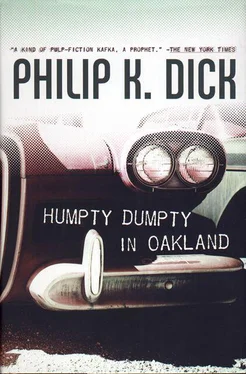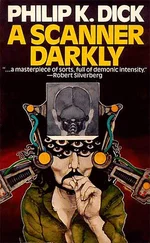His mind, however, said it for her.
On the screen, Groucho Marx insulted some man who had come up, grinning, wearing a suit. No matter what Groucho said, the man continued to grin. It was all fun. Watching, Jim Fergesson found himself stirring with restlessness. At last he shut off the set.
Is that all they have now? he asked himself. He turned the set on briefly, trying the other channels. Westerns, a panel discussion . . . he shut it off. Bunch of goofs, he thought. Especially those fairies, those grinning guys who play up to the ladies, give away dishes, kiss old ladies on the cheek. Ask moronic questions; a quiz. Good they got the big crooks, he thought. At least that’s gone. Especially that one, that intellectual. What a crook he was. Lydia had liked him so much, that Van Doren. He really took them in, the old man thought. But he never took me in with those manners. That educated crap. That polished front they teach them.
Going to the closet he got his coat. He did something that, although not usual, had come to him now and then in the past. Going downstairs to the street he locked the front door of the house (too bad, if she doesn’t have her key) and got into his parked car. A moment later he was driving along the dark street, in the direction of San Pablo Avenue, and his garage.
That’s what college ought to do, he thought as he drove. Give you the knowledge to tell a good man when you meet one. But look at Lydia, taken in by Van Doren. And look at Alger Hiss; look at how they all fell for him because he had that refined look, that thin face, the dignity and bearing and breeding, even though he was a Communist spy . . . even Stevenson fell for him. We might have had a President who would deliver the country over to those State Department Harvard queers in their striped pants. The only man who really saw through that was old Joe, and they got him; they ganged up on him because he was too blunt. He called a spade a spade.
He thought, Joe McCarthy saw through the lies and fraud that runs this society. And how he’s dead because of it.
When San Pablo Avenue appeared ahead, with its light, Jim Fergesson kept to the curb lane; he slowed his car, but not at his garage. Instead, he stopped a block away at a red neon sign: THE RING-A-DING CLUB, a bar that he visited when the mood came to him.
Quite a few people were in the bar; as he opened the door, noise spilled out over him, pleasing him. And the smells of people, the good warm smells; companionship, laughter, the racket of life—its characteristic motion and color. At the bar he found himself a place to stand, and ordered a Burgie.
There were even a few women in the bar. Mostly older, however. A glance showed him that they were shrill bags. He turned away.
By the entrance a tall middle-thirties Negro in a topcoat and tan sweater was blowing up a balloon. On the floor beside him a plump black and white springer spaniel panted and lolled its tongue. Everybody seemed to be watching the dog. The Negro blew on the balloon and it expanded; the people around him shouted different things, suggestions.
What’s this? Fergesson wondered. He turned to watch.
The dog, gasping, had risen on his haunches. His eyes were fixed on the balloon, which was now as large as a melon. The balloon was colored red. The man, laughing, lifted it away from his mouth and wiped his lips with the side of his hand. He was laughing too hard to blow.
“Here,” a companion said, reaching. “Give it to me, man.”
“No, you let me blow it; he like it better if I blow it.” The man blew again; the balloon swelled and the dog watched. Suddenly the man’s shoulders heaved and he dropped the balloon. The balloon fizzled away, darting. Hands flapped at it as it bounced to the floor. The dog whined and ran at it, then away again. His round body twitched. Leaning against the wall the man laughed soundlessly, and his friends groped among the tables and chairs for the empty balloon.
“I got more,” the man said, reaching into his topcoat pocket. Balloons spilled out like the fingers of gloves. “Man,” he gasped, “I got all the balloons in the world; let that go: it dirty.”
This time he blew up a yellow balloon. The dogs tongue went in and out and he swallowed. Strange, Fergesson thought. Why’s the dog interested? He thought about his own dog, dead under the wheels of a customer’s car. The dog had slept in the garage, under cars being worked on. Several years ago, now.
The yellow balloon had been blown up, and the Negro tied a knot in its neck. The dog, on his feet, whined avidly and lifted and lowered his head.
“Throw it for him,” a woman urged. “Don’t make him wait.”
“Go on,” a man at a table said.
“Yes, go on and let it go.”
The Negro, raising the balloon up high, let it fall. The dog caught it on his nose and bunted it. Up went the balloon, and drifted across a table. The dog followed and again he bunted it; the balloon rose and fell and the dog kept beneath it. People got out of his way. The dog scampered in a circle, his plump body pinwheeling and his mouth open. He saw nothing but the balloon, and when he crashed into a man the man moved and the dog went on.
Fergesson said to the man next to him, “Hey, they ought to commit that dog.” He began to laugh. He laughed until he felt tears coming out of his eyes; he leaned back against the bar and yelled with laughter. The dog tumbled across chairs and people’s feet, lunged at the balloon, knocked it again and again into the air, and then, in his excitement, bit into the balloon and popped it.
“Yaf!” the dog wheezed, and stopped short. His eyes smeared over and he sat breathing in huge, rough gulps. He seemed dazed. The fragments of the balloon were picked up by a young colored man in a purple shirt who examined them and then put them in the pocket of his sports coat.
“Jesus,” Fergesson said, wiping his eyes. The dog has settled down to rest and the man was again blowing up a balloon. This one was blue. “There he goes again,” he said to the man next to him, who also watched, grinning. “What does he do, go on all night? Doesn’t he get tired?”
“That’s enough,” the Negro said, letting the air out of the balloon.
“No, go on,” a woman said.
“One more,” a man at the bar said.
“He too tired,” the owner of the dog said, stuffing the balloon back into his pocket, “Later, maybe.”
To the man beside him, Fergesson said, “It doesn’t make sense. What’s the dog get out of it?”
The man shook his head, grinning.
“It’s contrary to nature,” Fergesson said. “It’s perverted. He probably thinks about nothing but balloons all day and night. Nothing but balloons.”
“Worse than some people,” the man beside him said.
“Animals have no sense,” Fergesson said. “They don’t know when to stop. They get an idea, and that’s all there is. They never lose it.”
“Instinct,” the man beside him said.
The dog’s owner, the tall Negro, moved from table to table with an open cigar-box. Bending, he spoke to persons and some of them dropped coins into the box. He reached the bar.
“For the dog,” he said. “He want to go to school and learn a trade.”
Fergesson put a dime in. “What’s his name?” he said. But the Negro had gone on.
“That colored guy,” the man next to Fergesson said, “probably trained him for TV. They have those dog acts on all the time.”
“They used to,” Fergesson said. “Not so much anymore. Now it’s mostly westerns, mostly for kids. I sure can’t watch them.”
“You think if you saw this on TV, this dog chasing a balloon, you’d laugh?”
“Sure, I’d laugh,” Fergesson said. “Didn’t you see me just now? I was laughing pretty hard. That’s exactly what I want to see on TV, real entertainment.”
Читать дальше










